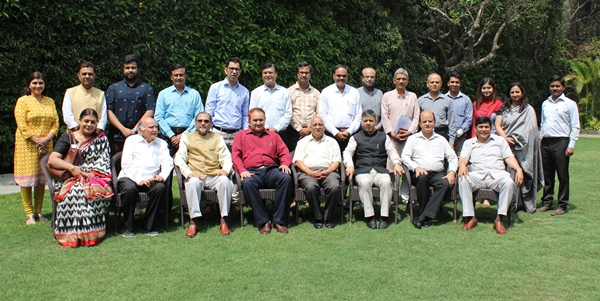CEMCA Think Tank Meet for finalisation of “Guidelines for Linking the Skill Programme with Academic Programme”
New Delhi: 12 April 2019: The 2 nd CEMCA Think Tank Meet was organised on 11 th April 2019 for finalisation of “Guidelines for linking the skill programme with Academic Programmes” at India International Centre (IIC), New Delhi. The opening session begin with a welcome address by Dr. Shahid Rasool, Director CEMCA where he welcomed all the participants and shared rationale and need for the Think Tank Meet followed by introduction by all the think tank members. Prof. Nageshwar Rao VC, IGNOU gave opening remarks on why such a meet is very important in the fast changing dynamic world where employability is a serious concern. Prof. Santosh Panda gave a presentation on “Revised guidelines for linking the skill programmes with academic programmes” He emphasised It is important to have a flexible framework of horizontal and vertical mobility, with lateral entry and exit option, with vocational education and general education. He further suggested that we can learn more from the European British and Australian models. The proposed action plan is to focus on 3 broad skill areas- discipline competencies, occupational skills and social and life skills. Thereafter, Ms. Sanjogita Mishra, Program Officer CEMCA shared about “Kaushal Mitra” which is a Counselling kit and an online tool developed by CEMCA for self- assessment of one’s personality and interest based on a small questionnaire. The house was then open for all the invited and acclaimed dignitaries to discuss and reflect on the “Draft guidelines for linking the skill programme with Academic Programmes”. There were multiple perspectives and views shared on the topic. The closing remarks were given by Prof. Nageshwar Rao, VC, IGNOU, Delhi followed by Vote of Thanks by Dr. Manas Ranjan Panigrahi who heartily thanked the distinguished guests to have taken out time for their valuable schedule for a cause which is going to help nation a lot. Some of the key recommendations were that there should be more involvement and synergy between academicians and experts from skill industry in designing the national Framework for specific sectors. There should be regular review of curriculum, so as to identify the existence or absence of the skills in the existing conventional discipline courses. The skill universities should also have academic departments, or vice-versa, so that both programs can interact and apart from this there were major concerns raised that the reforms are being implemented through the existing systems which are either inefficient or lack training and it is important that we should not dilute the aura of a graduation or master’s degree as it is important to keep the sanctity of these courses intact along with giving due importance to skills domain.



